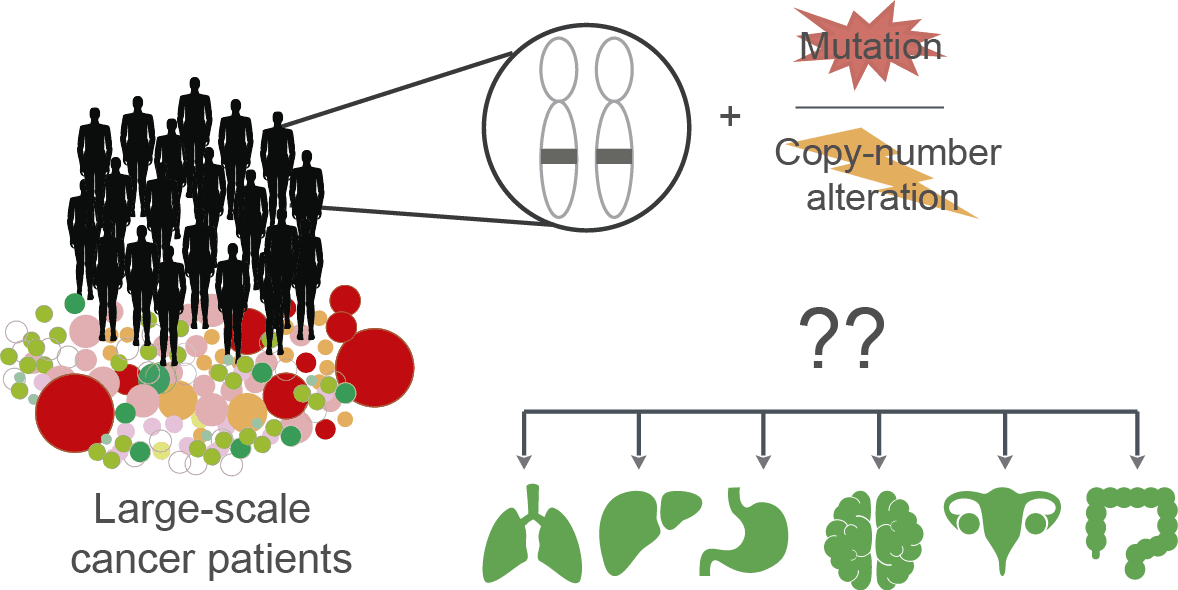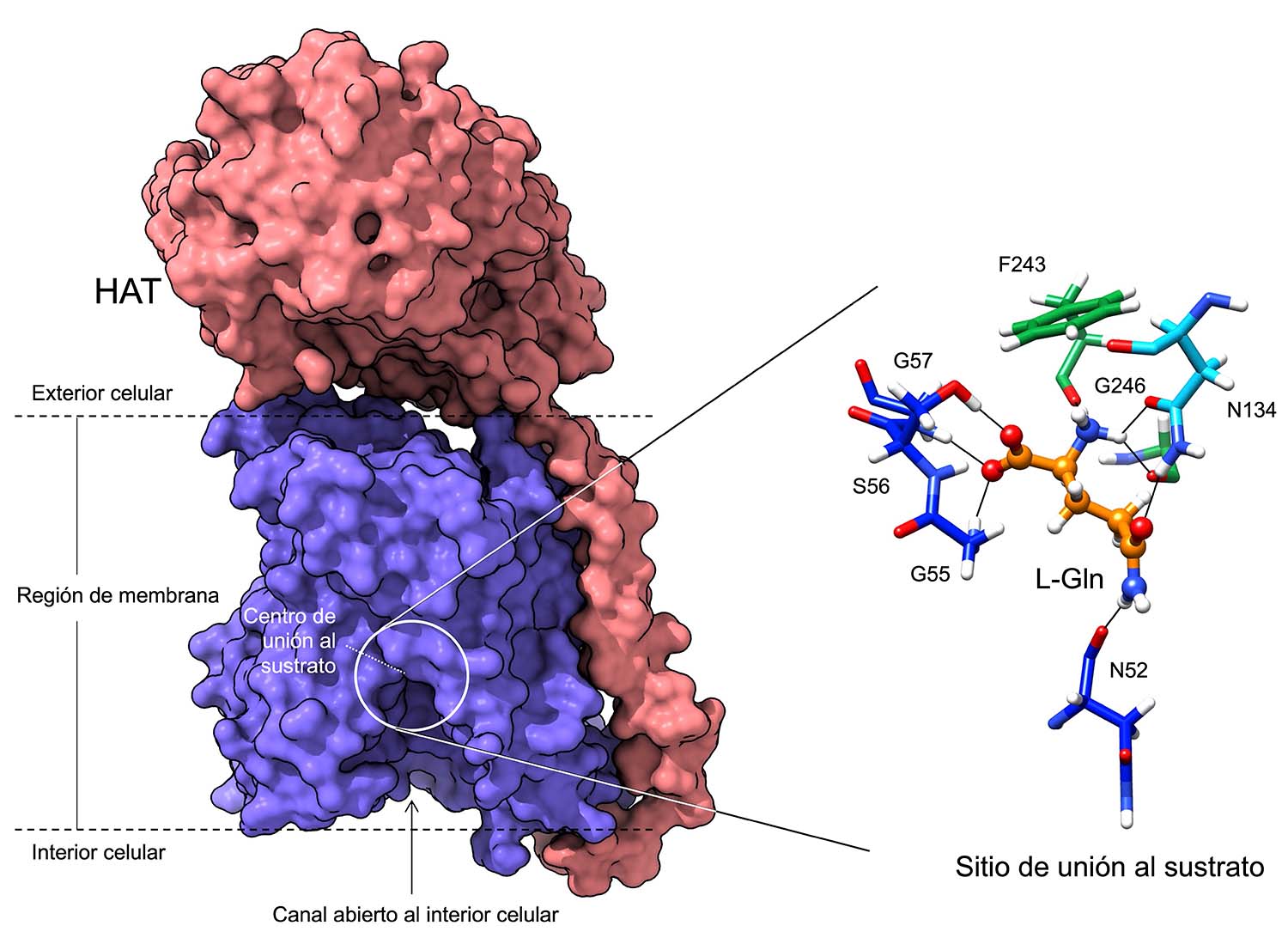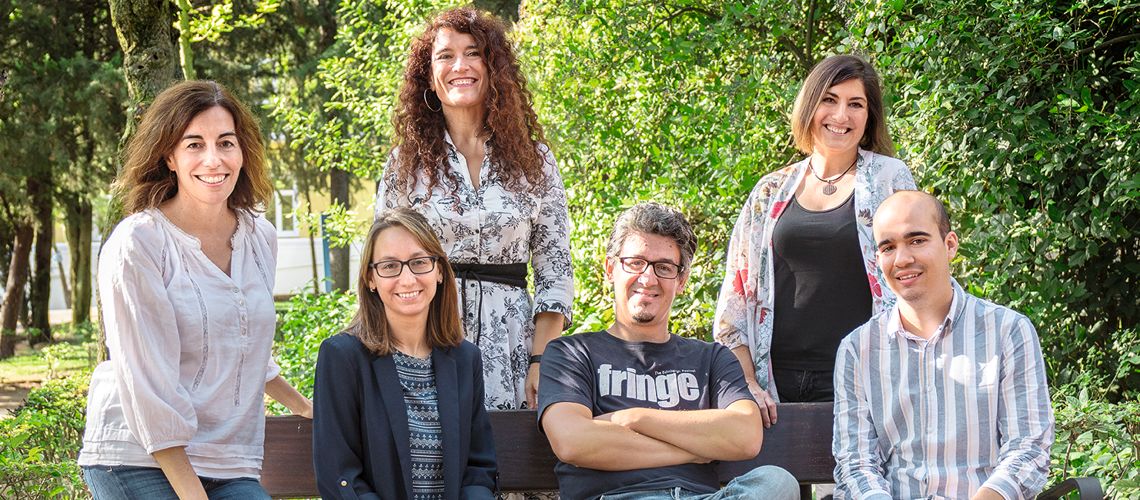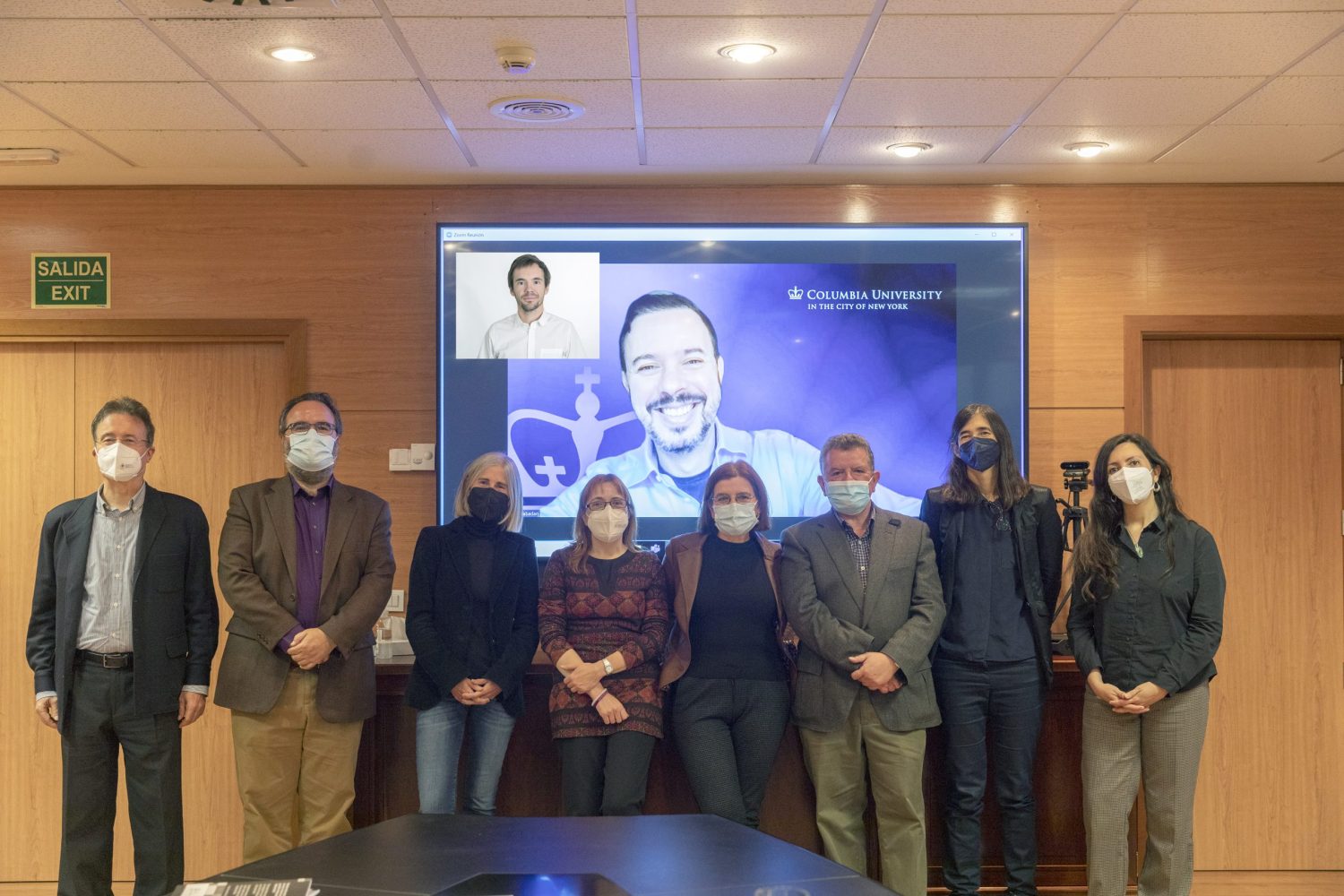This website uses cookies so that we can provide you with the best user experience possible. Cookie information is stored in your browser and performs functions such as recognising you when you return to our website and helping our team to understand which sections of the website you find most interesting and useful.
Column

Dear Friends,
In 2021, science played a crucial role in solving global challenges such as the one we continue to face in ending the Covid-19 pandemic.
After the relief provided by the arrival of several Covid-19 vaccines in 2021, reducing mortality from the disease, we are looking ahead to a 2022 full of renewed hopes in science. In this first newsletter of the year, I would like to remind you that the previous work done by scientists from around the world, developing innovative technologies for other fields and treatments, has accelerated the arrival of vaccines for Covid-19. That is why continued support for research is the way for all of us to be prepared to respond to new challenges facing us as a society.
The scenario is similar in cancer research. The more support we receive, the more we invest, the sooner and more accurately we can develop treatments that allow each patient to be cured. After the Christmas holiday, we returned at the start of this new year, determined to achieve all kinds of new goals in cancer research.
Scientists from CNIO continued to maintain their high productivity levels in 2021. In this link, you can see the different contributions our centre has made nationally and internationally. We are proud that the number of scientific publications and innovation contracts registered last year secured our reputation once again as one of the best and most prestigious cancer research centres in the world. According to the latest Nature Index ranking, we are the leading cancer research centre in Europe, and sixth in the world.
As an important part of our patient-oriented research, I am proud to report that Raul Rabadan is joining CNIO as an Associate Professor in the Human Cancer Genetics Programme. This position will allow us to bring on board one of the international leaders in the area of genomics and computational biology applied to the study of cancer.
And as for you, dear Friends, I would like to thank you for being there during this tough year and wish you a 2022 that is full of health and great achievements. I invite you to continue supporting us as we face the long road ahead of us together.
Maria A. Blasco
Director
MEET THE CNIO FRIENDS RESEARCHERS
Rubén Julio Martínez Torres
 Rubén Julio Martínez Torres. / CNIO
Rubén Julio Martínez Torres. / CNIO
We are delighted to profile another CNIO Friends Post-Doctoral Research Fellow, whose salaries are financed 100% by your philanthropic donations.
Rubén Julio Martínez Torres joined the lab of Ivan Plaza at the CNIO at the beginning of 2020 to investigate how RET oncogene activity is altered in certain cancer types, such as lung and breast cancer, as well as neuroblastoma. Rubén’s project aimed to find compounds capable of inhibiting this gene that could provide more effective treatments against these types of tumours.
Rubén received his PhD from University College London in the UK, before taking on a post doc position at the Pastor Institute in Lille, France.
We asked Rubén what attracted him to cancer research, and why he felt the CNIO was the best place for his work. He explained that “the combination of the CNIO’s good reputation in science, and this coveted fellowship, was my motivation to apply. In particular, I wanted to be in a place that does multidisciplinary research and the CNIO very good for that”. He was particularly attracted by the competitiveness of the research centre. In his work, he enjoys working across disciplines such as translational medicine and structural biology and has great interaction with a number of different departments.
Rubén explained: “I am always inspired by the progress reports that are undertaken regularly by different scientists across the CNIO, which allows you to see what everyone else is doing and opens opportunities for collaboration”.
Originally from Mexico, Rubén arrived in Spain just before the SAR-COV-2 pandemic started, and that slowed the project down in the beginning. Overall, he has enjoyed the opportunity to use the facilities at the CNIO and has been pleased with the direction of the project. Rubén explained that “cancer research is like running a marathon – you know where you want to go but you still have miles ahead of you. It can be hard work, but it can be exciting and that what keeps you motivated. I am very grateful for the CNIO Friends for supporting this program and enabling me to work in this exciting area”.
CNIO SCIENTIFIC NEWS
 Human cells with DNA damaged by a laser beam in the laboratory. In green, the classic repair protein gammaH2AX bound to laser-generated breaks; in red, the protein RNF166 discovered in this work coupled with DNA breaks, coinciding with gammaH2AX; in blue, cellular DNA. /Bárbara Martínez-Pastor and Giorgia G. Silveira. CNIO, MGH.
Human cells with DNA damaged by a laser beam in the laboratory. In green, the classic repair protein gammaH2AX bound to laser-generated breaks; in red, the protein RNF166 discovered in this work coupled with DNA breaks, coinciding with gammaH2AX; in blue, cellular DNA. /Bárbara Martínez-Pastor and Giorgia G. Silveira. CNIO, MGH.
Each of the hundreds of trillions of cells that make up our body endure more than 10,000 DNA injuries every day. Researcher Bárbara Martínez, from the Cell Metabolism and Signalling Group, led by Alejo Efeyan from CNIO, has managed to visualise DNA repair machinery in detail never seen before, together with researchers from the Massachusetts General Hospital in the US.
 According to this large-scale study of cancer patient data, the same genomic alterations have a different effect depending on their interaction with other mutations present in different types of cancer. /Solip Park. /CNIO
According to this large-scale study of cancer patient data, the same genomic alterations have a different effect depending on their interaction with other mutations present in different types of cancer. /Solip Park. /CNIO
Researchers from CNIO have discovered in a collaborative study why some genes require one or two mutations to promote cancer. This research paves the way to decipher the functioning of the five hundred or so mutations known to be involved in cancer.
“It is the first systematic, in-depth, multi-data analysis of the interactions between genetic alterations involved in cancer,” says Solip Park, joint leader of this study.
 Structure of the LAT2/CD98hc protein, resolved by cryogenic electron microscopy. Blue indicates the region that binds to amino acids to allow transport within and out of cells. In this region, the amino acid binding centre is highlighted, which opens within the inside of the cell. /CNIO
Structure of the LAT2/CD98hc protein, resolved by cryogenic electron microscopy. Blue indicates the region that binds to amino acids to allow transport within and out of cells. In this region, the amino acid binding centre is highlighted, which opens within the inside of the cell. /CNIO
Why are some proteins involved in the development of diseases such as cancer and other similar ones involved in other diseases such as Alzheimer’s or deafness? CNIO researcher Óscar Llorca is the joint leader of a study that uncovers the functioning of very specific proteins known as HAT.
These findings help clarify why the different HAT proteins are involved in specific diseases such as cancer, in some cases, or in neurological diseases such as stroke, Alzheimer’s or deafness, in others. The great challenge for researchers now will be to intervene on these proteins to tackle these diseases.
 Researchers Héctor Peinado and Susana García Silva at the entrance to CNIO. / Laura M. Lombardía. /CNIO
Researchers Héctor Peinado and Susana García Silva at the entrance to CNIO. / Laura M. Lombardía. /CNIO
“Not only must we look inside the tumour, but also outside,” says CNIO researcher Héctor Peinado. How do tumours manipulate their exterior surroundings in order to advance?
Peinado’s team has discovered a mechanism involved in the early stages of melanoma metastasis. Its blockage dramatically reduces lymph node metastases in animal models. Should it progress to patients, this treatment would become one of the first to deal with metastasis in its earliest stages.
Our centre
 Team from the CNIO Biobank, led by the scientist Eva Ortega; in the image, standing, in the centre. /CNIO
Team from the CNIO Biobank, led by the scientist Eva Ortega; in the image, standing, in the centre. /CNIO
Philosophy and Science: the use of animals in Science and Lab Day 2021 are two of the most relevant events organised by CNIO towards the end of 2021.
In addition, the centre has received funding from the Spanish Cancer Association (AECC) for the project led by Nabil Djouder to investigate treatments against the most recurrent type of liver cancer, as well as the excellent news that the Mark Foundation, located in the United States, will fund an ambitious project led by Manuel Valiente to cure brain metastases.
We have also received good news about the appointment of the director of the CNIO Biobank, Eva Ortega, as coordinator of Spain’s participation in the European Biobank Infrastructure.
The CNIO Biobank is a service platform that aims to promote biomedical research in general, facilitating access to human samples by researchers and ensuring the collection and use of human samples; respecting at all times the legal and ethical precepts that protect the rights of donors, contained in Spanish legislation and recommended internationally. All according to quality criteria both in the collection of samples and in their subsequent management. The work of the Biobank is essential in order to carry out the high-quality research we do at CNIO.
INTERVIEW
Héctor Peinado
 Héctor Peinado, head of CNIO’s Microenvironment and Metastasis Group. / CNIO
Héctor Peinado, head of CNIO’s Microenvironment and Metastasis Group. / CNIO
Héctor Peinado heads up the Microenvironment and Metastasis Group and has just published new research on melanoma and its metastases
What have you discovered?
In this paper, we describe how this critical process of metastasis occurs in melanoma progression: particles secreted by the tumour (called exosomes) travel and lodge in the sentinel node (lymph node where metastasis initially occurs), from where they remotely prepare the enabling environment, the so-called “pre-metastatic niche” to promote metastasis.
We have observed that a molecule (called NGFR) is secreted into exosomes and directs this whole process.
What would you highlight from this study?
The most important aspect from a therapeutic point of view is that blocking this molecule drastically reduces metastases in animal models.
How is it achieved?
This reduction in metastasis has been achieved through the use of a specific inhibitor (called THX-B), which we are evaluating as an anti-metastatic therapy in melanoma right now.
How would your work be translated in patients?
The study of NGFR in sentinel lymph nodes in patients with melanoma has shown that it can be used as a molecule that identifies early metastases and could serve to identify patients at risk of progression. Overall, this work demonstrates a new mechanism involved in the initiation of the metastatic process in melanoma with potential diagnostic and therapeutic use.
UNDER DEBATE
Alternatives to animal research
 From left to right, Guillermo Repetto, Lluís Montoliu, Lucía Arana, Marta Tafalla, Arantza Etxebarria, Antonio Dieguez, María Blasco and Fabiola Leyton. On screen: Manuel Valiente and Raúl Rabadán /Laura M. Lombardía. CNIO
From left to right, Guillermo Repetto, Lluís Montoliu, Lucía Arana, Marta Tafalla, Arantza Etxebarria, Antonio Dieguez, María Blasco and Fabiola Leyton. On screen: Manuel Valiente and Raúl Rabadán /Laura M. Lombardía. CNIO
One of the objectives of the events we organise at CNIO is to spark debate about some of the most relevant scientific topics at each moment. With this idea, the last event on Philosophy and Science, organised with the support of Fundación Banco Sabadell, discussed alternatives to animal research.
Scientists Manuel Valiente, Lluís Montoliu, Raúl Rabadán and Maria A. Blasco debated with philosophers Fabiola Leyton, Marta Tafalla and Guillermo Repetto, and journalist Lucia Arana during the 3rd CNIO-Fundación Banco Sabadell Conference on Philosophy and Science, held last November. This event addressed the ethical and epistemic problems of animal use in science, as well as the possible alternatives that scientists have begun to explore.
Although the use of animals is necessary for the study of certain pathological processes, the development of alternative techniques to animal experimentation will make it possible to reduce and replace experimental animals with these techniques. This was made clear at the convention, which was held in person at CNIO headquarters, and was also streamed to over 300 people who signed up online.
Many researchers share the concerns of animal advocates about the need to use animals in order to advance scientific progress. Indeed, since the 1980s, tremendous progress has been made, both in raising awareness about the use of good practices and in respecting the protocols approved in recent decades by the authorities, and new generations of researchers agree on the need to find alternatives to this practice. These were some of the conclusions presented by the participants at this conference, which also made known some of the different options that have already begun to be used in various fields.
One such option was presented by Guillermo Repetto, a professor in the Department of Toxicology at the Universidad Pablo de Olavide, during his speech: “The idea is to avoid experimenting with animals if there is no need for them. The paradigm is whether the models are good or bad. And ideally, we should be getting data from humans, and when this is not possible, we should be seeing, on a case-by-case basis, whether animal experimentation is right.”
Distinguished Seminars
05.11.2021
Clara Montagut
Hospital del Mar, Barcelona, Spain.
`Clinical utility of liquid biopsy in colorectal cancer´.
17.12.2021
Serena Nik-Zainal
Hutchison/MRC Research Centre - University of Cambridge, UK.
Recent insighs into somatic mutagenesis in human cancers and cell systems
